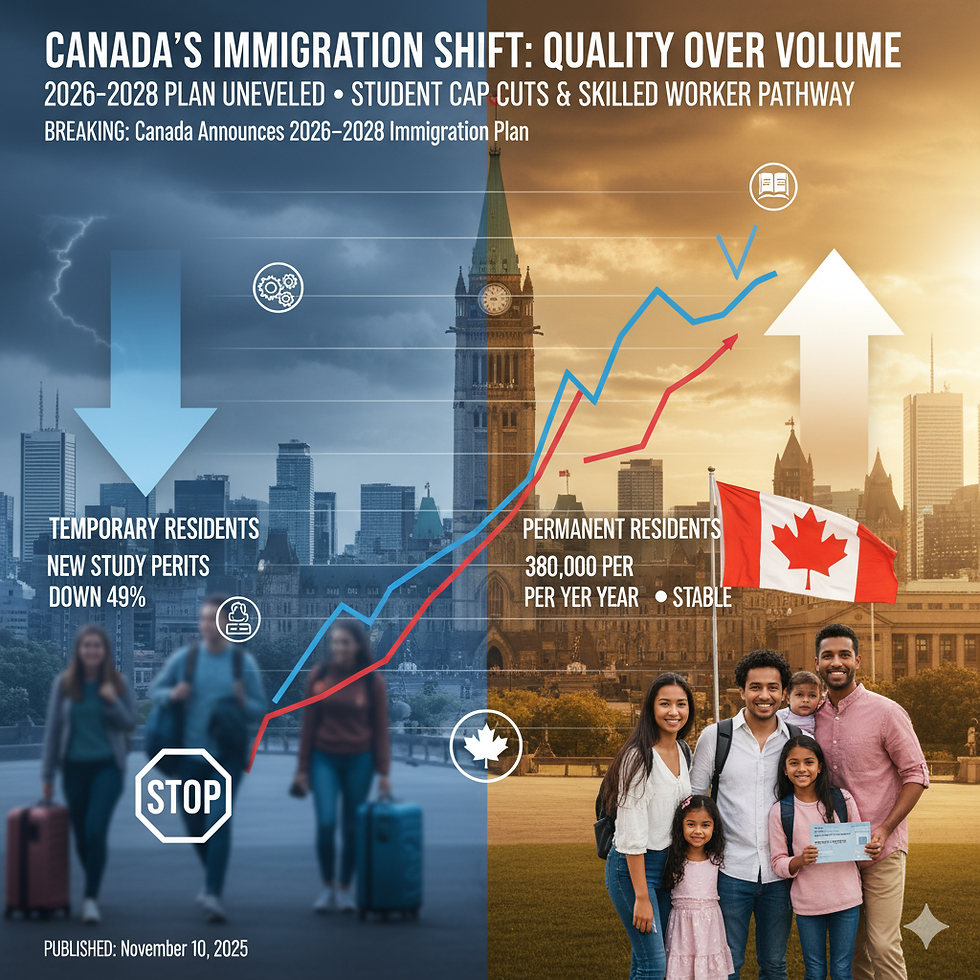Changing Study Permit Conditions and Unscheduled Breaks in Canada
- Ardalan Ansari
- Apr 6, 2024
- 4 min read
In the dynamic world of immigration, staying informed about the latest requirements and procedures is crucial, especially when it comes to changing conditions of a study permit in Canada. Whether you're looking to switch programs, institutions, or extend your stay, understanding the technicalities of updating your study permit is essential. Let's dive into the nitty-gritty of the process, shedding light on the steps and documentation you need to navigate changing the conditions of your study permit and consequences of unscheduled breaks in Canada.

Step 1: Determine Your Need for a Change
Before you start the process, it's important to identify the nature of the change you're seeking:
Switching Programs or Levels of Study: If your new program is at the same educational level as your current one, you may not need to change your study permit. However, a shift in the level of study (e.g., from a bachelor's degree to a master's) will require an update.
Changing Institutions: Moving from one designated learning institution (DLI) to another necessitates notifying Immigration, Refugees and Citizenship Canada (IRCC) to update your permit.
Extending Your Stay: If you wish to continue studying beyond the expiry date of your current permit, you must apply for an extension.
Eligibility Criteria for Changing Conditions:
Ensure that you meet the eligibility criteria set by the immigration authorities before applying for any changes to your study permit.
Factors such as maintaining full-time student status, academic performance, and compliance with permit conditions are typically considered.
The Impact on Your Study Permit
Consider Your Post-Graduation Work Permit (PGWP): The length of your studies and the type of programs you choose can influence your eligibility for the PGWP, a key pathway for graduates aiming to gain work experience in Canada.
Actively Pursuing Studies
Regardless of the change, you must continue to actively pursue your studies. This is a condition of your study permit that requires you to be enrolled at a Designated Learning Institution (DLI) and to make reasonable progress toward completing your courses.

Step 2: Gather Your Documents
The documentation you need will vary based on the type of change you're making. Generally, you'll need:
Proof of Acceptance: A new letter of acceptance from a DLI is mandatory if you're changing institutions or programs. A deferral letter can sometimes work in some situations. Please reach out to us directly for an accurate answer, depending on your scenario.
Proof of Identity: This includes a valid passport and any other identification documents specified by IRCC.
Proof of Financial Support: You must demonstrate that you can support yourself (and any accompanying family members) during your extended stay or new program.
Step 3: Apply Online
All changes to your study permit must be applied for online through the IRCC website. Here’s how:
Create an Account: If you haven’t already, set up an account on the IRCC website. You can choose to use a GCKey or sign in with a partner service.
Fill Out the Application: Select the form for "Applying for a change of conditions or an extension of my stay or remain in Canada as a student" (IMM5709). Ensure you answer all questions accurately to reflect your situation.
Upload Documents: Scan and upload all the required documents listed in your application checklist.
Pay the Fee: As of my last update, the fee for changing conditions or extending a study permit is CAD$150. Ensure you have a credit or debit card ready for payment.
Submit Your Application: Once everything is in order, submit your application. You'll receive a confirmation and a receipt for your payment.

What Constitutes an Unscheduled Break? Study Permit Conditions
An unscheduled break is any hiatus from your studies that isn't part of your designated learning institution's (DLI) regular academic calendar—think of it as stepping away from your studies outside of the usual summer or winter breaks. Reasons for unscheduled breaks can range from personal health issues to family emergencies.
The Impact on Your Study Permit
Your study permit is issued with the expectation that you are actively pursuing your studies in Canada. Here's how taking an unscheduled break might affect it:
Status of Study Permit: Generally, your study permit allows for scheduled breaks as per your institution's academic calendar. However, for unscheduled breaks, you must maintain your status as an active student. Failure to do so might lead to complications with your permit.
Implications for Compliance: The IRCC requires students to actively pursue studies while in Canada. Taking a break without informing your institution and potentially the IRCC may be viewed as non-compliance with the conditions of your permit.
Ensuring Compliance During an Unscheduled Break
To minimize the impact on your immigration status, consider the following steps:
Inform Your Institution: Communication is key. Inform your DLI about your situation and the need for an unscheduled break. Some institutions may have policies or support services in place for such situations.
Consult With an Immigration Advisor: Before making any decisions, it's wise to speak with an immigration advisor familiar with student permits. They can offer guidance specific to your situation and help you understand your options.
Document Your Reason: Keep detailed documentation of the reason for your break, such as medical records or family correspondence. This documentation can be crucial if you need to explain your break to immigration authorities.
The Impact on Future Immigration Documents
Taking an unscheduled break can also affect future immigration opportunities, including:
Post-Graduation Work Permit (PGWP) Eligibility: The PGWP allows graduates to gain valuable Canadian work experience. However, eligibility criteria include continuous full-time study. An unscheduled break might affect your eligibility, depending on the duration and reasons for the hiatus.
Pathway to Permanent Residency: Work experience gained through the PGWP can be a stepping stone to permanent residency. Any impact on your PGWP eligibility might also affect your future residency applications.




Comments